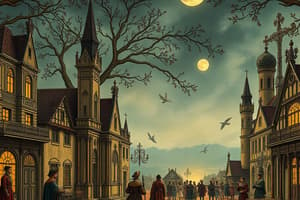Podcast
Questions and Answers
What were Huguenots?
What were Huguenots?
Who was Catherine de Medici?
Who was Catherine de Medici?
Regent for her sons in France, a Catholic, and a politique.
Name the sons of Catherine de Medici.
Name the sons of Catherine de Medici.
Francis II, Charles IX, and Henry III.
What significant event occurred at the wedding of Margaret Valois?
What significant event occurred at the wedding of Margaret Valois?
Signup and view all the answers
The House of Valois was a ruling family in France that followed Protestantism.
The House of Valois was a ruling family in France that followed Protestantism.
Signup and view all the answers
What are politiques?
What are politiques?
Signup and view all the answers
What happened during the Saint Bartholomew's Day Massacre?
What happened during the Saint Bartholomew's Day Massacre?
Signup and view all the answers
Who was Henry of Navarre?
Who was Henry of Navarre?
Signup and view all the answers
What was the Catholic Holy League?
What was the Catholic Holy League?
Signup and view all the answers
What was the War of the Three Henries?
What was the War of the Three Henries?
Signup and view all the answers
What did the Edict of Nantes accomplish?
What did the Edict of Nantes accomplish?
Signup and view all the answers
Who was Philip II of Habsburg Family?
Who was Philip II of Habsburg Family?
Signup and view all the answers
What was the Battle of Lepanto?
What was the Battle of Lepanto?
Signup and view all the answers
What sparked the Dutch Revolt?
What sparked the Dutch Revolt?
Signup and view all the answers
Who led the northern Dutch revolts?
Who led the northern Dutch revolts?
Signup and view all the answers
What were the 'Sea Beggars'?
What were the 'Sea Beggars'?
Signup and view all the answers
What was Elizabeth I's policy towards religion?
What was Elizabeth I's policy towards religion?
Signup and view all the answers
What did the Acts of Supremacy declare?
What did the Acts of Supremacy declare?
Signup and view all the answers
What was the purpose of the Act of Uniformity?
What was the purpose of the Act of Uniformity?
Signup and view all the answers
Who was Mary, Queen of Scots?
Who was Mary, Queen of Scots?
Signup and view all the answers
What were Puritans?
What were Puritans?
Signup and view all the answers
Who was Francis Drake?
Who was Francis Drake?
Signup and view all the answers
What was the Spanish Armada?
What was the Spanish Armada?
Signup and view all the answers
What was the witchcraft craze?
What was the witchcraft craze?
Signup and view all the answers
Study Notes
Huguenots and French Wars of Religion
- Huguenots: French Calvinists opposed to Catholicism, played a significant role in the French Wars of Religion.
- Civil conflicts between Huguenots and Catholics marked this tumultuous period in French history.
Key Figures in the French Monarchy
- Catherine de Medici: Catholic regent for her sons, known for her efforts to achieve a religious compromise amid conflict.
- Francis II, Charles IX, Henry III: Sons of Catherine de Medici, heirs to the French throne; significant players in the Wars of Religion.
- Margaret Valois: Catholic sister of Henry III, married Henry of Navarre; her wedding sparked the Saint Bartholomew's Day Massacre.
Significant Events and Policies
- Saint Bartholomew's Day Massacre: A violent outbreak resulting in 3,000 Huguenots killed over three days, initiated by assassinations of Huguenot leaders.
- War of the Three Henries: Conflict between Henry III, Henry of Navarre, and Henry of Guise; resulted in political intrigue and the eventual rise of Henry of Navarre to the throne.
- Edict of Nantes: Policy that ended religious conflict in France, officially established Catholicism while granting Huguenots freedoms.
The Catholic Church and Militarism
- Catholic Holy League: A coalition of ultra-Catholics aimed at eliminating Protestantism and promoting Henry of Guise’s claim to the throne.
- Philip II of Habsburg: King of Spain who pursued Catholic militantism, aiming for dominance in Europe and the unification of Spain and the Netherlands.
Conflicts and Revolts
- Battle of Lepanto: Naval battle where Spain, led by Philip II, defeated the Turks, a significant victory for Christendom.
- Dutch Revolt: Resistance against Spanish authority in the Netherlands, aimed at freeing northern provinces from religious and economic oppression.
- William of Orange: Leader of the Dutch Revolts, advocated for the unity of provinces while respecting religious differences.
English Reformation and Political Developments
- Elizabeth I: Queen known for her politique approach, emphasized religious toleration and effective foreign policy during the late 1500s.
- Acts of Supremacy: Established Elizabeth I as the supreme governor of the realm, facilitating a compromise between Catholic and Protestant preferences.
- Act of Uniformity: Reinstated Church services per the Book of Common Prayer, tailored to accommodate both Protestant and Catholic practices.
Socio-Political Tensions
- Mary, Queen of Scots: Catholic claimant to the English throne; executed after plots against Elizabeth I.
- Puritans: English Protestants who sought to purify the Church of England from Catholic influences.
- Witchcraft Craze: A consequence of heightened religious tensions, resulting in widespread accusations and persecution of alleged witches, predominantly older women.
Naval Engagements and Conflicts
- Francis Drake: Notorious English privateer who plundered Spanish treasure fleets, contributing to England’s naval reputation.
- The Spanish Armada: A fleet assembled for the invasion of England; ultimately failed due to a storm and effective English defenses.
Overall Context
- The period marked by these events reflects the intersection of religion, politics, and societal unrest across Europe, with significant implications for the future governance and religious landscape.
Studying That Suits You
Use AI to generate personalized quizzes and flashcards to suit your learning preferences.
Description
Test your knowledge of key terms and figures from the Wars of Religion in Europe with these AP Euro flashcards. Each card provides essential definitions and contextual information to help you understand the complexities of this turbulent period.




